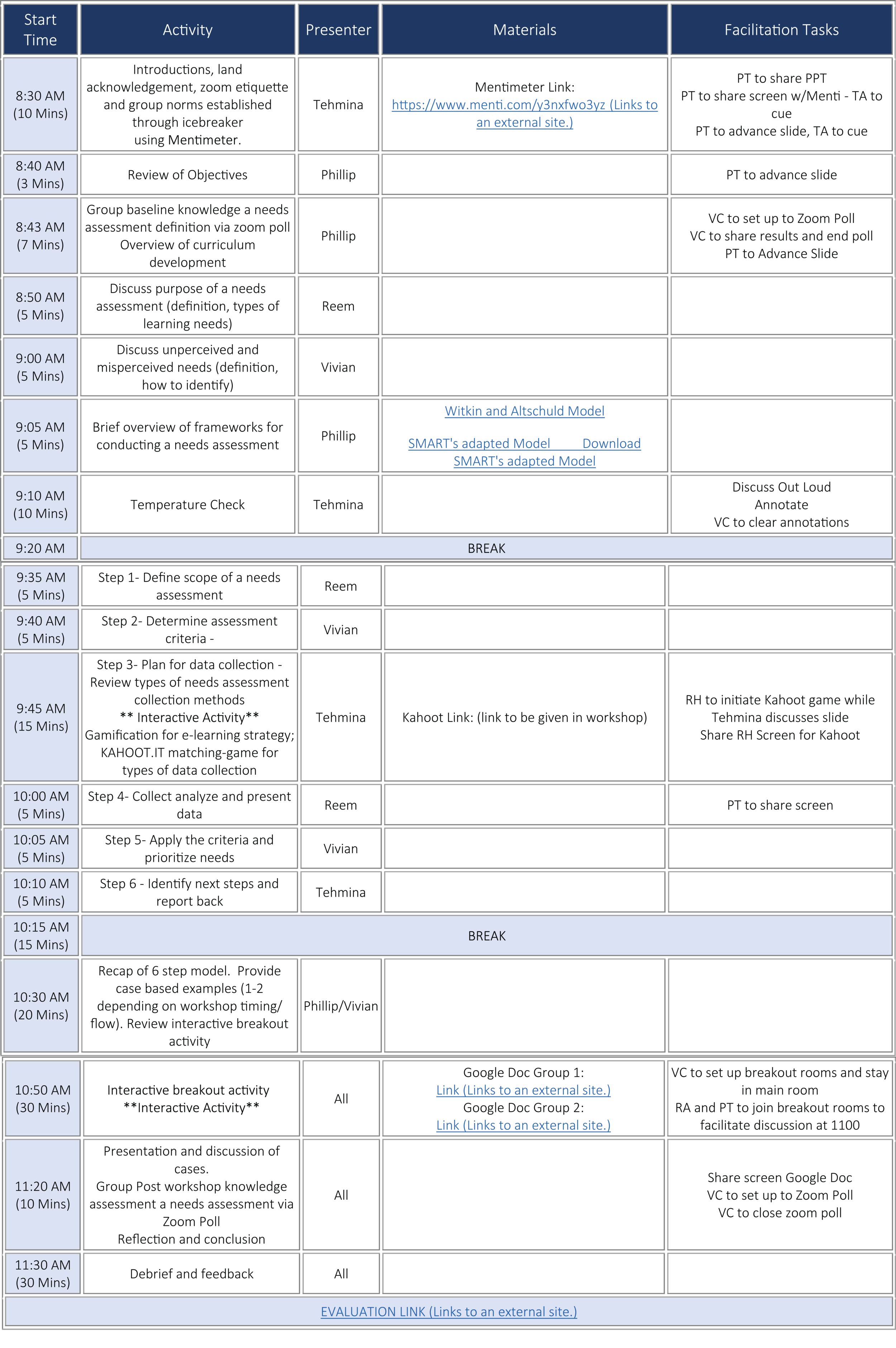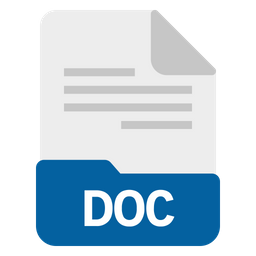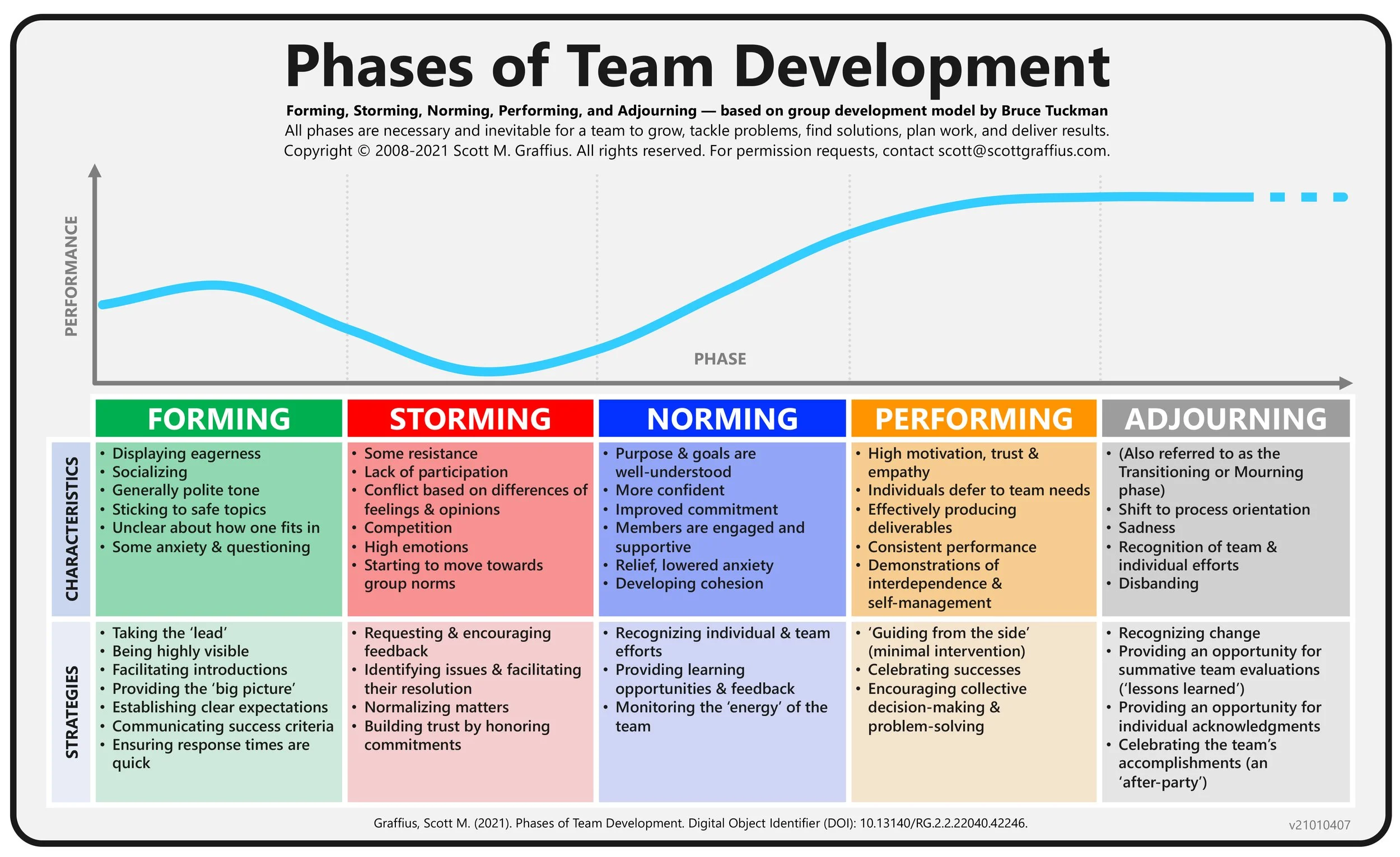
Group Project
Original Workshop Proposal (09/11/2021)
Title: Conducting A Needs Assessment - Do You Really Need It?
Presenters: Tehmina Ahmad, Vivian Choo, Reem Hamdonah, Phillip Tsang
Topic content Area: Curriculum development with a focus on conducting a needs assessment
Workshop Lesson Plan Design:
Group Organization
Roles:
Group Leader - Vivian Choo
Meeting Chair - Tehmina Ahmad/Reem Hamdonah
Minutes/Scribe - Phillip Tsang
Schedule:
Meetings will be scheduled q2 weeks on Monday via zoom to review our progress and discuss any updates.
References for Proposal:
Smart J. Needs assessment: Families and Children Expert Panel practice resource. Australian Institute of Family Studies; 2019 Mar 29.
Ratnapalan S, Hilliard RI. Needs assessment in postgraduate medical education: a review. Medical Education Online. 2002 Dec 1;7(1):4542.
Bice-Stephens W. Designing a Learning-Needs Survey-10 Steps to Success. 2001 32 (4). 150-151.

Final Workshop Outline
January 28th, 2022
Workshop Title:
Conducting A Needs Assessment - Six-Steps to Success (28/01/2022)
Presenters: Tehmina Ahmad, Vivian Choo, Reem Hamdonah, Phillip Tsang
Topic Area: Curriculum development with a focus on conducting a needs assessment
Workshop Abstract:
"Conducting A Needs Assessment - Do You Really Need It?" Is a 3.5 hour workshop conducted by Tehmina Ahmad, Vivian Choo, Reem Hamdonah, and Phillip Tsang, which covers the topic of a needs assessment. The intended audience of this workshop is health care professionals interested in continuing education and professional development new to academic curriculum development. The goal of this workshop is to understand the process of conducting a curricular needs assessment and how it fits into the broader process of curriculum design. At the end of this workshop, participants should be able to list the steps utilized in the Smart's adapted 6-step model, recognize six data collection methods for a needs assessment, and apply the model to a case-based scenario. The workshop will start with an introduction to needs assessment and where it fits into curricular design, followed by an in-depth review of each of the steps within the Smart's adapted 6 step model. Finally, participants will be able to apply these new skills using a case-based example.
Intended Audience:
Health Care Professionals interested in continued education and professional development new to academic curriculum development.
Learning Objectives:
Define terminology involved in needs assessments.
Identify 3 frameworks for conducting a needs assessment.
Recognize six data collection methods of a needs assessment.
Apply the Smart's adapted 6-step model to a case-based-scenario in a break-out session.
eLearning Strategy:
Gamification - will use Kahoot/Matching game.
Adaptation of the “layered cake” model for eLearning.
Handouts:
Needs Assessment Worksheet - Needs Assessment Worksheet.docx Download Needs Assessment Worksheet.docx
Conducting a Needs Assessment Handout [quick guide].pdf Download Conducting a Needs Assessment Handout [quick guide].pdf
Conducting a Needs Assessment Handout [full handout].pdf Download Conducting a Needs Assessment Handout [full handout].pdf
Powerpoint presentation: INTAPT Slides - Needs Assessment - 2 per page-3.pdf Download INTAPT Slides - Needs Assessment - 2 per page-3.pdf, INTAPT Slides - Needs Assessment - 3 per page-2.pdf Download INTAPT Slides - Needs Assessment - 3 per page-2.pdf
Resources/Suggested Readings:
Smart J. Needs assessment: Families and Children Expert Panel practice resource. (Links to an external site.)Australian Institute of Family Studies; 2019 Mar 29
Leigh D, Watkins R, Platt WA, Kaufman R. Alternate models of needs assessment: Selecting the right one for your organization (Links to an external site.). Human Resource Development Quarterly. 2000 Mar;11(1):87-93.
Zoom Link for Workshop:
INTAPT TEAM TO PROVIDE ZOOM LINK
healthteach grad is inviting you to a scheduled Zoom meeting.
Topic: INTAPT Student Workshop - DAY 8 AM-
Time: Jan 28, 2022 08:30 AM Eastern Time (US and Canada)
Join Zoom Meeting
https://zoom.us/j/94966238774
Meeting ID: 949 6623 8774
One tap mobile
+16475580588,,94966238774# Canada
+17789072071,,94966238774# Canada
Dial by your location
+1 647 558 0588 Canada
+1 778 907 2071 Canada
+1 204 272 7920 Canada
+1 438 809 7799 Canada
+1 587 328 1099 Canada
+1 647 374 4685 Canada
Meeting ID: 949 6623 8774
Find your local number: https://zoom.us/u/aNCq1ogF
**If there are any issues logging in with the above link please use the meeting ID.
-
Health Care Professionals interested in continued education and professional development new to academic curriculum development.
Lesson Plan - Final Workshop Outline:
References for Workshop:
Kern DE, Thomas PA, Howard DM, Bass EB. Chapter 1: Curriculum development for medical education: A six-step approach. The Johns Hopkins University Press, Baltimore MD; 1998. P4-7
Mohanna K, Cottrell E, Chambers R, Wall D. Chapter 7: Teaching made easy: a manual for health professionals. Radcliffe Publishing; 2011. p81-99
University of Toronto Office of continuing education and professional development. Quick Tips: Methods of Learning Needs Assessment. Retrieved Nov 29, 2021 from: https://www.cpd.utoronto.ca/newsletter/2009_fall/Quick_Tips_methods_of_learning_Needs_Assesment.pdfLinks to an external site.
Witkin BR, Altschuld J. Planning and conducting needs assessments: A practical guide. Sage; 1995 Sep 7.
Smart J. Needs assessment: Families and Children Expert Panel practice resource. Australian Institute of Family Studies; 2019 Mar 29.
Bice-Stephens W. Designing a Learning-Needs Survey-10 Steps to Success. 2001 32 (4). 150-151x
Quality Improvement & Innovation Partnership. Needs Assessment resource Guide. From: http://www.hqontario.ca/portals/0/documents/qi/qi-rg-needs-assessment-0901-en.pdf (Links to an external site.)
Ratnapalan S, Hilliard RI. Needs assessment in postgraduate medical education: a review. Medical Education Online. 2002 Dec 1;7(1):4542.
Kern DE, Thomas PA, Howard DM, Bass EB. Chapter 3: Curriculum development for medical education: A six-step approach. The Johns Hopkins University Press, Baltimore MD; 1998. p20-27.
Post-Workshop Reflection & Workshop Evaluations
(12/02/2022)
When reflecting on the workshop as a whole – I thought it ran as a smooth performance with carefully coordinated parts working behind the scenes, like the Wizard in the “Wizard of Oz”, we all had a role to play to ensure the zoom dynamics were kept engaging and interesting. The workshop itself borrowed heavily from the needs assessment model in Kern et al. (1998), scoping review (Ratnapalan and Hilliard 2002) and Smart’s (2019) modified 6-step model for conducting a needs assessment. What was important to our team was taking a relatively dry-topic, and giving it relevance within the curricular cycle, while delivering an interactive workshop. Our learning objectives of defining terminology, identifying 3 frameworks for conducting needs assessments, and applying Smart’s adapted 6-step model were clearly outlined and met.
We captured in our pre-test polling that the majority of participants had heard about a needs assessment, but were not comfortable conducting one themselves. We saw this improve post-workshop with the majority of participants being more comfortable with performing a needs assessment. Receiving feedback from the participants and our reviewer provided important reflection on engagement, and where the workshop may have required more time, or less time. Although well-rehearsed, we saw that we were running 10 minutes behind, which cut into our main group activity, which was well-received as the pinnacle of working through how one would begin conducting a needs assessment. If we were to re-create this workshop again, we would spend less time on walking through our own example of how to conduct a needs assessment and more time within the individual groups facilitating and guiding our participants through the assessment themselves.
Overall, we successfully laid out a clear narrative, with demonstrable change in knowledge acquired via pre- and post-testing (see below for workshop feedback).
Group Charter (26/10/2021)
Group Dynamic & Charter Reflection (12/02/2022)
We began as a group of complete strangers and truly embraced Tuckman’s model of forming–storming–norming–performing-adjourning. Our group consisted of two family physicians, one medical radiation technologist, and myself (endocrinology fellow).
Our group charter laid groundwork of opportunities and challenges set ahead of us, while simultaneously allowing for goals to be set and tasks to be tackled. I feel very fortunate in that the personalities of our group members all seem to mesh well. We oriented well to the deadlines at hand and began to create standards of work. For me, I had to relinquish the Type A personality in myself to get work done ahead of time, rather than on time. I had to trust in my group members – we effectively partook in ‘forming’.
Storming became evidence in our weekly meetings. Although there would be disagreements, our rule was to always be critical of the idea, and never the person from whom the idea came. This allowed us to focus on our strengths as a team, ‘norming’ the process of collaboration and ambition towards completing the workshop.
We were ‘performing’ as we each had individually worked on sub-sections and brought the presentation together for dress-rehearsals. The day of the workshop itself was a well-coordinated performance. We had developed a presentation script, such that each group member could follow along, and knew exactly what media/interactive activities were coming next, and who was to cue them off. This script was essential, because in the event that one group member lost internet connection or had technical difficulties, any group member could easily jump in to takeover, as we all knew each other’s segments so well.
The difference in personalities in our group played as a real asset, as it gave different levels to our presentation, allowing for areas of our presentation to speed-up, slow-down, be engaging, and allow for thoughtful reflection of our participants. Although we are ‘adjourning’, I would easily work with any of my colleagues again, as we stuck to the values of our charter and used the charter to play on our strengths.
References:
Tuckman, B. W. (1965). Developmental sequence in small groups. Psychological bulletin, 63(6), 384.
Graffius, Scott M. (2021). Phases of Team Development. Digital Object Identifier (DOI): 10.13140/RG.2.2.22040.42246. DOI link: https://dx.doi.org/10.13140/RG.2.2.22040.42246














